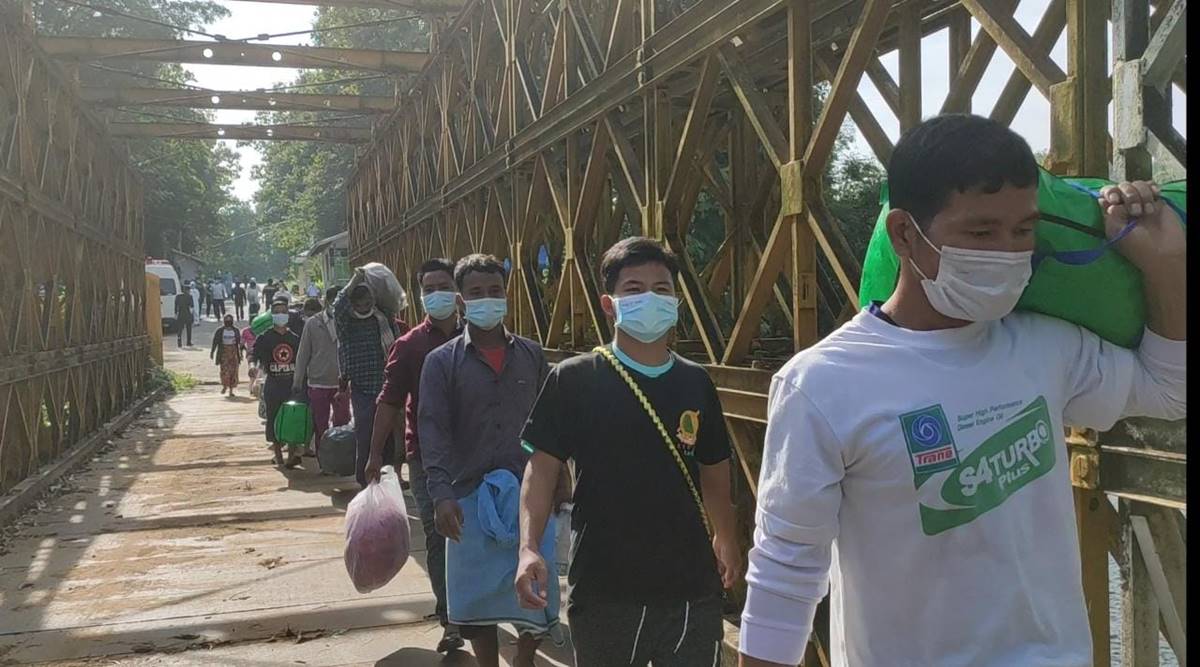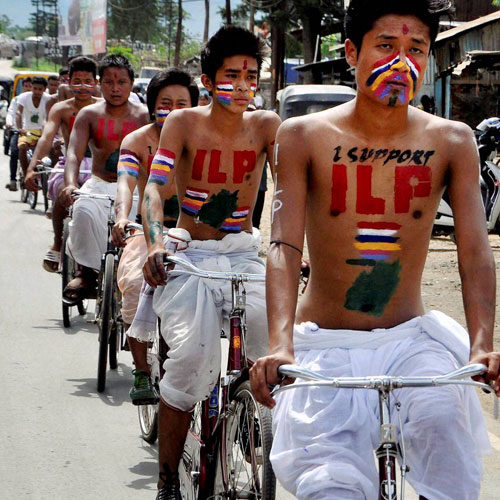Recently, Frontier Manipur has been reporting in detail on the sensational drug haul case involving a person said to be close to chief minister N. Biren Singh.

Paojel Chaoba and Dhiren Sadokpam. Photos: Facebook
New Delhi: In yet another case of the Bharatiya Janata Party-led Manipur government rounding up journalists in the state under draconian laws, two senior journalists Paojel Chaoba and Dhiren Sadokpam have been detained on Sunday. While Chaoba is the executive editor of The Frontier Manipur, an online news portal, Dhiren is the portal’s editor.
According to a police statement, a case under the Unlawful Atrocities (Prevention) Act (UAPA) and Section 124A (sedition) of the Indian Penal Code has been filed against “the editors of the Facebook page of the news portal” along with M. Joy Luwang, the author of an article published in The Frontier Manipur on January 8.
Chaoba and Dhiren’s detention has come close on the heels of the arrest of another Imphal-based journalist, Kishorechandra Wangkhem, multiple times under several draconian laws, including the National Security Act and sedition. A well-known name in the state’s journalistic circles, Chaoba has a number of investigative stories under his byline at the Imphal Free Press, including about a Manipur police officer going on the record for the first time about carrying out fake encounters on innocent civilians in the insurgency-ridden state. Dhiren is the former editor-in-chief of Imphal Free Press.
Recently, Frontier Manipur has been reporting in detail on the sensational drug haul case involving a person said to be close to chief minister N. Biren Singh. State police officer Thonoujam Brinda had said in a sworn affidavit in the Manipur high court that she was under pressure from the chief minister to release the person from custody.
Even though the person, Lukhosei Zou, was arrested by the state police on finding drugs worth Rs 27 crore from his residence, a special court acquitted him in December. Following his acquittal, Brinda had returned the police gallantry medal accorded to her by the chief minister for her credible work in fighting the drug menace in Manipur.
The FIR filed by the officer commanding P. Sanjoy Singh on January 17, at the Singjamei police station in Imphal West district against The Frontier Manipur publishing the article mentions that it spotted the article with the headline “Revolutionary Journey in a Mess” on January 17, 12:30 pm. Soon the FIR was filed charging Luwang and the editors of the portal for “attempting to bring hatred/contempt/disaffection against government; criminal conspiracy and statements conducting to public mischief with common intention by being Sympathiser of unlawful organization punishable under 124A/120B/505B/34 of the IPC and section 39 of the UAPA Act”.
According to the latest information from Imphal, a police team arrived at Chaoba’s house at Thambeiband leikai of Imphal on January 17 morning and asked him to accompany them, but he refused. Later, when he reached the police station on his own, he was detained. Towards the evening, Dhiren Sadokpam too was summoned for interrogation and detained thereafter.
Advocate Gunadhar Singh, looking into the case, told The Wire, “It is not clear yet whether Chaoba has been arrested or still detained. Dhiren has been summoned for interrogation. Anyway, even if he is arrested, being a Sunday, he will be produced before a magistrate only tomorrow, following which we will submit our bail application in the court.” Around 9 pm, news came that Dhiren too had been detained.
The author of the article has not been detained so far. The police statement said that the author through the article “openly endorsed revolutionary ideologies and activities and expressed shock and dismay at the deteriorating character of the armed revolutionary leaders of Manipur in the recent decade”.
“He called out to the people of Manipur to become true revolutionaries….His article clearly expressed sympathy and support to the ideologies and activities of armed revolutionary groups and outrightly called the rule of law of the union and state governments As colonial law thereby attempting to bring hatred, contempt and feeling of Enmity against the rule of kaw and government which is likely to cause fear ir alarm in public inducing them to commit an offence against the state thereby posing serious threats of internal security issues,” the police continued.
Interestingly, though the same article was published earlier in Imphal Times and Kangla Pao, these news publications have not been named in the FIR. While the article in Kangla Pao was published in Meitelion in October 2020, the same report was published in Imphal Times on January 3.
The Wire tried to contact the Singjamei police station multiple times for more information on the case, but has failed to get in touch so far.
Chaoba’s wife A. Sanahanbi Devi has submitted a letter to the president of the All Manipur Working Journalists’ Union (AMWJU), informing them of his detention and urged it to do the needful. Sources in the AMWJU have said that its executive members would meet on Monday to discuss the issue.
On Monday, the Foundation for Media Professionals issued a statement condemning the journalists’ detention. The statement points out that the Centre has for years been engaged in talks with insurgent groups, and leaders of such groups have often subsequently become minister or prominent politicians. “They were not charged with sedition or terrorism,” the statement reads. “…It is therefore odd that mere publication of an OpEd article on some such groups should draw extreme charges upon editors.”
The Foundation for Media Professionals has issued a statement on the detention of two Manipur journalists using sedition and UAPA @NBirenSingh @SanjoyHazarika3 @MrSamratX @RevatiLaul @paranjoygt @nit_set pic.twitter.com/DxWVB1pusq
— Media Track (@mediatrack_in) January 18, 2021
Also on Monday, the Editor’s Guild of India criticised the Manipur police, the action indicates “no media organisation is safe from the irrational use of these laws”. It demanded the immediate release of the two journalists, adding that the cases pose a threat to free expression and democracy itself.
The Editors Guild of India has issued a statement on the arrest of journalists in Manipur under sedition laws as well as UAPA. EGI demands the immediate release of the editors and withdrawal of these cases that pose a threat to free expression, and to democracy itself. pic.twitter.com/GQqFGZw7yP
— Editors Guild of India (@IndEditorsGuild) January 18, 2021
Note: This article was updated at 4:44 pm on January 18 to include the statement issued by the Editor’s Guild of India.

























